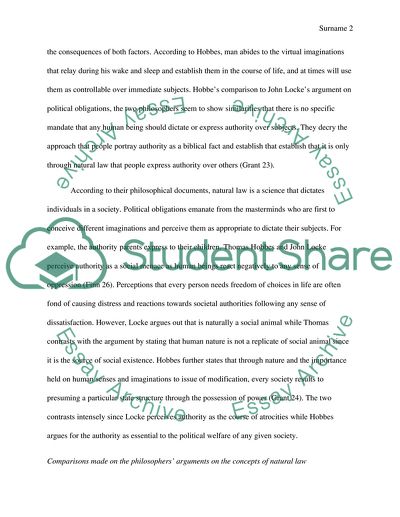Cite this document
(“Compare Hobbes and Lockes account of politics and political obligation Essay - 1”, n.d.)
Compare Hobbes and Lockes account of politics and political obligation Essay - 1. Retrieved from https://studentshare.org/history/1618050-compare-hobbes-and-lockes-account-of-politics-and-political-obligation-and-how-it-draws-on-the-tradition-of-natural-law-to-make-their-arguments-even-though-they-believe-in-science-rather-than-religion-or-ideology
Compare Hobbes and Lockes account of politics and political obligation Essay - 1. Retrieved from https://studentshare.org/history/1618050-compare-hobbes-and-lockes-account-of-politics-and-political-obligation-and-how-it-draws-on-the-tradition-of-natural-law-to-make-their-arguments-even-though-they-believe-in-science-rather-than-religion-or-ideology
(Compare Hobbes and Lockes Account of Politics and Political Obligation Essay - 1)
Compare Hobbes and Lockes Account of Politics and Political Obligation Essay - 1. https://studentshare.org/history/1618050-compare-hobbes-and-lockes-account-of-politics-and-political-obligation-and-how-it-draws-on-the-tradition-of-natural-law-to-make-their-arguments-even-though-they-believe-in-science-rather-than-religion-or-ideology.
Compare Hobbes and Lockes Account of Politics and Political Obligation Essay - 1. https://studentshare.org/history/1618050-compare-hobbes-and-lockes-account-of-politics-and-political-obligation-and-how-it-draws-on-the-tradition-of-natural-law-to-make-their-arguments-even-though-they-believe-in-science-rather-than-religion-or-ideology.
“Compare Hobbes and Lockes Account of Politics and Political Obligation Essay - 1”, n.d. https://studentshare.org/history/1618050-compare-hobbes-and-lockes-account-of-politics-and-political-obligation-and-how-it-draws-on-the-tradition-of-natural-law-to-make-their-arguments-even-though-they-believe-in-science-rather-than-religion-or-ideology.


